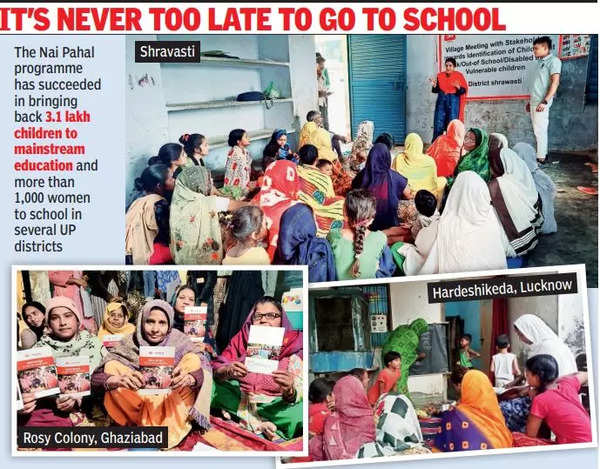“I asked the conductor what the last stop was. He looked at me, told me to read the board and laughed. It was deeply embarrassing,” says the 65-year-old from Ghaziabad’s Rosy Colony who started going to school two weeks ago.

Across UP, more than 1,000 women – mothers, elder sisters, aunts, grandmothers, relatives – who never went to school have been brought into the education fold by a programme meant for out-of-school children. As volunteers of Action Aid and Unicef went about asking families if their kids were in school, they received several requests from older women interested in studies.
Gulistan, who was project coordinator when Nai Pahal reached Shravasti in 2021-22 in the wake of the pandemic, says many children were encouraged to resume studies seeing their mothers attend classes. “When the kids saw their mothers could identify alphabets and even read them, they, too, wanted to join the classes,” she says.
After attending the first few classes, Meena Devi (35) of Shravasti even started helping volunteers find kids who needed to be persuaded back to school.
“I couldn’t even fill forms for govt schemes I was interested in. Govt has so many schemes for women. It should also make efforts to educate women,” she says.
Shahjahan Bano, who is among 30 women from Rosy Colony to have shown interest in attending afternoon classes, says she has always yearned to be independent and going to school had given her that sense, even if a much belated one. “All my life, I was dependent. As a kid, my father, then my husband, and after his death, my sons,” she says. “I wanted to study not just for independence, but self-respect too.”
As Covid left many jobless and kids out of school – many of them because of displacement as the lockdown triggered waves of reverse migration – finding out-of-school children became necessary as normalcy began to return. In the volunteers who came home, adults recognised an opportunity.
“The primary objective was to acquire basic literacy so that they can get jobs. Not just women, some men too wanted to enrol in rural areas,” says Kehkasha Parween, the state head of Action Aid.
Anita Maurya (55) found herself an accountant’s job at a small enterprise after attending the classes in Lucknow’s Hardeshikeda village. “All I wanted was some basic education in letters and numbers so that I could earn for my family and manage my affairs,” she says. Learning also brought a sense of empowerment. “People shouldn’t think I don’t know anything,” she adds.
Rina (32) thought she should educate herself because she wants to “attend school PTMs (parent-teacher meetings). She has three children. “I always feared facing teachers because I don’t understand what they say about academics,” she says.
Fatema (28) shares her textbooks and lessons with four classmates – Atri (65), Nasreen (60), Ruksana (30), Sama (32) and Shabana (60) – who are all enrolled in Ghaziabad. After her divorce, Fatema says she had to find a job and believes she will eventually get one. “Who will give me a job if I don’t know how to read and write?” she says.
Three groups of 10 women each have been attending these classes five days a week in Ghaziabad. Officials here have decided to get the women enrolled in primary schools through the basic education department later.
Apart from Rosy Colony, women from Bhichal Dwar have also shown interest in the initiative. “Once they are done with their classes and pass the exams, they will be given certificates from the basic education department,” says Neelam Vaish, the Action Aid coordinator in Ghaziabad.
Nai Pahal has succeeded in bringing back women and kids to school in Barabanki, Bahraich, Balrampur, Gonda, Siddharthnagar, Mahoba, Chitrakut, Muzaffarnagar and Lalitpur, among others, officials said. Between 2018 and 2022, 3.1 lakh children were brought back to mainstream education in these districts.
Action Aid employed 6,245 volunteers across the state to implement the project. “It’s a good initiative, which we plan to bring under our signature campaign, Shaksar Abhiyan. We will provide whatever support is needed,” says OP Yadav, the basic education officer in Ghaziabad.